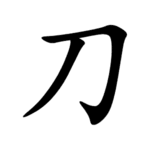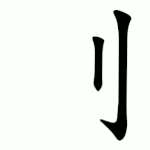Radical 18
Radical 18 or radical knife (刀部) meaning "knife" is one of 23 Kangxi radicals (214 radicals total) composed of 2 strokes.
| 刀 | ||
|---|---|---|
| ||
| 刀 (U+5200) "knife" | ||
| Pronunciations | ||
| Pinyin: | dāo | |
| Bopomofo: | ㄉㄠ | |
| Wade–Giles: | tao1 | |
| Cantonese Yale: | dou1 | |
| Jyutping: | dou1 | |
| Pe̍h-ōe-jī: | to | |
| Japanese Kana: | トウ tō (on'yomi) かたな katana (kun'yomi) | |
| Sino-Korean: | 도 do | |
| Names | ||
| Chinese name(s): | (刂) 立刀旁 lìdāopáng | |
| Japanese name(s): | 刀 katana (刂) 立刀/りっとう rittō | |
| Hangul: | 칼 kal | |
| Stroke order animation | ||
 | ||

Stroke order of the right component form 刂
When appearing at the right side of a Chinese character, it usually transforms into 刂.
In the Kangxi Dictionary, there are 377 characters (out of 49,030) to be found under this radical.
刀 is also the 22nd indexing component in the Table of Indexing Chinese Character Components predominantly adopted by Simplified Chinese dictionaries published in mainland China. Two associated indexing components, 刂 and ⺈, are affiliated to the principal indexing component 刀.
Evolution
 Oracle bone script character
Oracle bone script character Bronze script character
Bronze script character Large seal script character
Large seal script character Small seal script character
Small seal script character
Derived characters
| Strokes | Characters |
|---|---|
| +0 | 刀 刁 刂component only |
| +1 | 刃SC/KO/刃TC/刃JP 刄 (=刃) |
| +2 | 刅 分 切 刈 |
| +3 | 刉 刊 刋 (=刊) 刌 刍SC (=芻 -> 艸) |
| +4 | 刎 刏 刐 刑 划 刓 刔 刕 刖 列 刘SC (=劉) 则SC (=則) 刚SC (=剛) 创SC (=創) |
| +5 | 刜 初 刞 刟 删SC variant (=刪) 刡 刢 刣 判 別TC/JP variant 刦 (=劫 -> 力) 刧 (=劫 -> 力) 刨 利 刪TC/JP variant 别SC variant (=別) 刬SC (=剗) 刭SC (=剄) |
| +6 | 刮 刯 到 刱 (=創) 刲 刳 刴 (=剁) 刵 制 刷 券 刹SC/JP (=剎) 刺 刻 刼 (=劫 -> 力) 刽SC (=劊) 刾SC (=㓨) 刿SC (=劌) 剀SC (=剴) 剁 剂SC (=劑) |
| +7 | 剃 剄 剅 剆 則 剈 剉 削 剋 剌 前 剎 剏 (=創) 剐SC (=剮) 剑SC (=劍) |
| +8 | 剒 剓 剔 剕 剖 剗 剘 剙 (=創) 剚 剛 剜 剝 剞 剟 剠 剡 剢 剣JP (=劍) 剤JP (=劑) 剥SC/JP (=剝) 剦 (=閹 -> 門) 剧SC (=劇) 剮GB TC variant |
| +9 | 剨 剪 剫 剬 剭 剮Traditional variant 副 剰JP (=剩) 剱JP nonstandard (=劍) |
| +10 | 剩 割 剳 剴 創 剶 |
| +11 | 剷 剸 剹 剺 剻 剼 剽 剾 剿 |
| +12 | 劀 劁 劂 劃 劄 |
| +13 | 劅 劆 劇 劈 劉 劊 劋 劌 劍 劎 (=劍) 劏 |
| +14 | 劐 劑 劒 (=劍) 劓 劔 (=劍) |
| +15 | 劕 |
| +17 | 劖 |
| +19 | 劗 劘 |
| +21 | 劙 劚 |
Sinogram
As an isolated character it is one of the Kyōiku kanji or a kanji taught in second grade. [1]
References
- "The Kyoiku Kanji (教育漢字) - Kanshudo". www.kanshudo.com. Archived from the original on March 24, 2022. Retrieved 2023-05-06.
Literature
- Fazzioli, Edoardo (1987). Chinese calligraphy : from pictograph to ideogram : the history of 214 essential Chinese/Japanese characters. calligraphy by Rebecca Hon Ko. New York: Abbeville Press. ISBN 0-89659-774-1.
- Leyi Li: “Tracing the Roots of Chinese Characters: 500 Cases”. Beijing 1993, ISBN 978-7-5619-0204-2
This article is issued from Wikipedia. The text is licensed under Creative Commons - Attribution - Sharealike. Additional terms may apply for the media files.